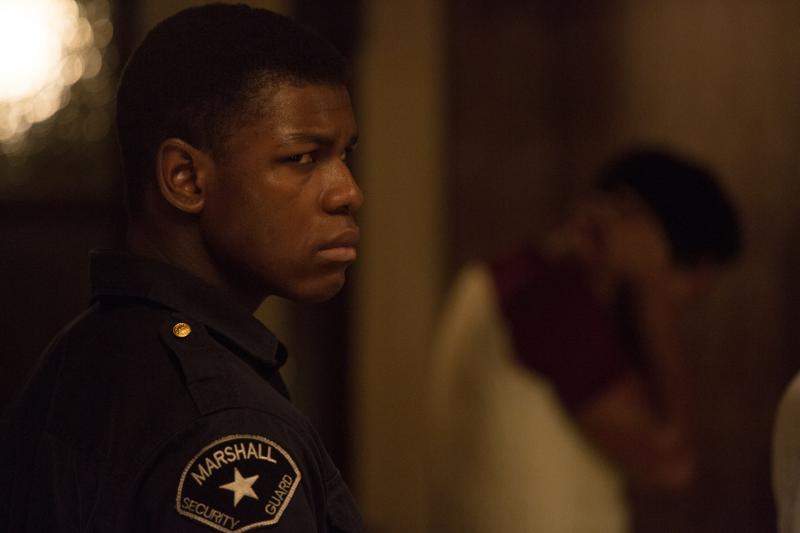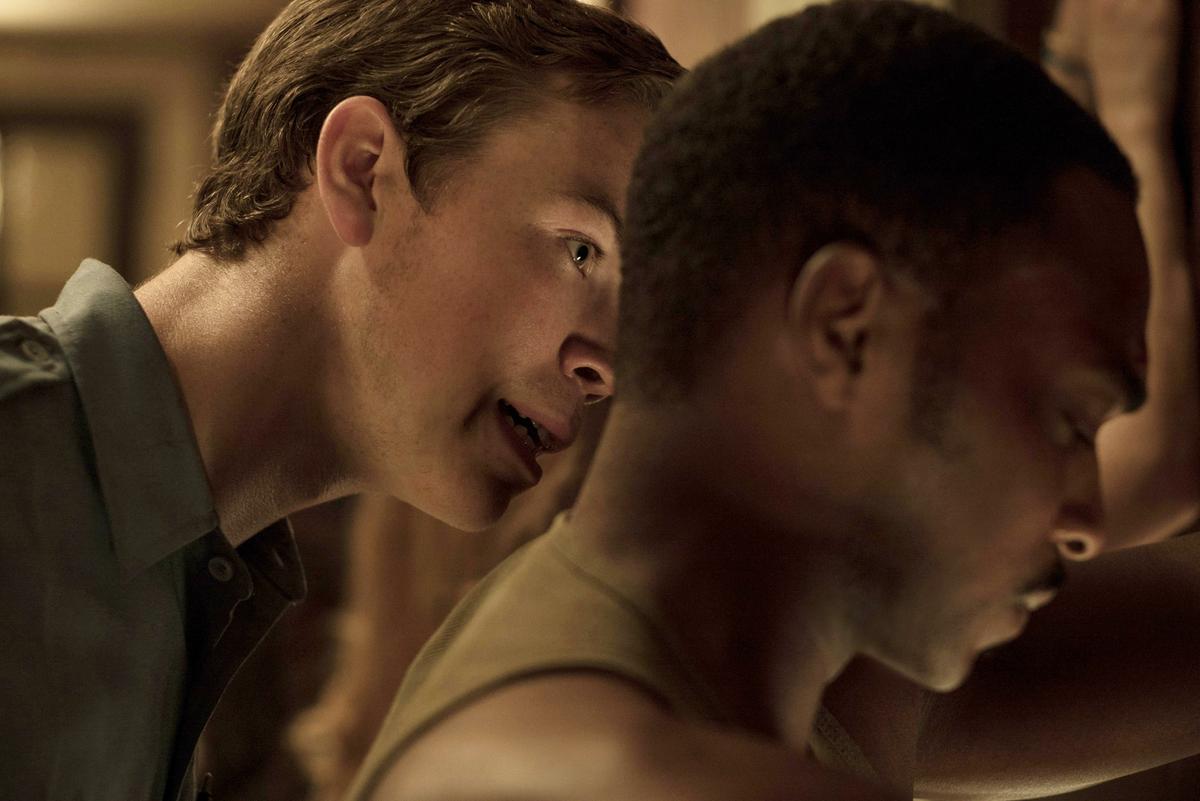DVD/Blu-ray: Detroit | reviews, news & interviews
DVD/Blu-ray: Detroit
DVD/Blu-ray: Detroit
Kathryn Bigelow's remembrance of riot and racism keeps a claustrophobic grip

Detroiters razed sections of their own city as surely as Rome did Carthage, during five summer days in 1967. It took, amongst others, the 101st Airborne – victors at the Battle of the Bulge, then just back from Vietnam – to crush America's worst race riot of the decade.
Though Bigelow has gained her greatest acclaim for claustrophobically sombre work torn from the headlines in The Hurt Locker and Zero Dark Thirty, her most visionary film, Strange Days (1995), found a near-future LA fearing fracture over footage of a racist police murder. Detroit narrows that situation down to a corridor and adjacent rooms in the Algiers Motel, where three black men were murdered on July 25, 1967.
 Mark Boal’s screenplay sketches the injustice and violent, racist policing which made the city a powder-keg. Bigelow’s camera is jittery during the police raid which lit the spark, then flows as if blown on the breeze after the first rioter as he smashes a window. Soon soldiers are silhouetted, bayonets fixed, in eerie yellow smoke.
Mark Boal’s screenplay sketches the injustice and violent, racist policing which made the city a powder-keg. Bigelow’s camera is jittery during the police raid which lit the spark, then flows as if blown on the breeze after the first rioter as he smashes a window. Soon soldiers are silhouetted, bayonets fixed, in eerie yellow smoke.
The parallel lives of black security guard Melvin Dismukes (John Boyega), two members of Motown wannabes the Dramatics, and murderous white cop Philip Krauss (Will Poulter, pictured above right) then converge on the Algiers. This is a sensual, social sanctuary from the chaos for Dramatics singer Larry Reed (Algee Smith), as he debates John Coltrane and flirts with two white girls. Then Krauss is at their door, and Bigelow crowds in tight on a nightmarishly prolonged, seemingly real-time interrogation which leaves three “suspects” dead. You can almost smell the clammy helplessness and prejudice. The numbing legal aftermath for the survivors is worse. America shunned Detroit at the box-office (as it had Strange Days). Shame and catharsis still await it here.
So does the rich humanity expressed in Detroit’s music, a dream the broken Reed turns his back on in fear and loathing. Amongst otherwise unremarkable extras which briefly contextualise the film’s events, seeing the real Larry Reed duet with Algee Smith therefore blazes with redemptive beauty.
rating
Explore topics
Share this article
The future of Arts Journalism
You can stop theartsdesk.com closing!
We urgently need financing to survive. Our fundraising drive has thus far raised £49,000 but we need to reach £100,000 or we will be forced to close. Please contribute here: https://gofund.me/c3f6033d
And if you can forward this information to anyone who might assist, we’d be grateful.

Subscribe to theartsdesk.com
Thank you for continuing to read our work on theartsdesk.com. For unlimited access to every article in its entirety, including our archive of more than 15,000 pieces, we're asking for £5 per month or £40 per year. We feel it's a very good deal, and hope you do too.
To take a subscription now simply click here.
And if you're looking for that extra gift for a friend or family member, why not treat them to a theartsdesk.com gift subscription?
more Film
 Blu-ray: The Sons of Great Bear
DEFA's first 'Red Western': a revisionist take on colonial expansion
Blu-ray: The Sons of Great Bear
DEFA's first 'Red Western': a revisionist take on colonial expansion
 Spinal Tap II: The End Continues review - comedy rock band fails to revive past glories
Belated satirical sequel runs out of gas
Spinal Tap II: The End Continues review - comedy rock band fails to revive past glories
Belated satirical sequel runs out of gas
 Downton Abbey: The Grand Finale review - an attemptedly elegiac final chapter haunted by its past
Noel Coward is a welcome visitor to the insular world of the hit series
Downton Abbey: The Grand Finale review - an attemptedly elegiac final chapter haunted by its past
Noel Coward is a welcome visitor to the insular world of the hit series
 Islands review - sunshine noir serves an ace
Sam Riley is the holiday resort tennis pro in over his head
Islands review - sunshine noir serves an ace
Sam Riley is the holiday resort tennis pro in over his head
 theartsdesk Q&A: actor Sam Riley on playing a washed-up loner in the thriller 'Islands'
The actor discusses his love of self-destructive characters and the problem with fame
theartsdesk Q&A: actor Sam Riley on playing a washed-up loner in the thriller 'Islands'
The actor discusses his love of self-destructive characters and the problem with fame
 Honey Don’t! review - film noir in the bright sun
A Coen brother with a blood-simple gumshoe caper
Honey Don’t! review - film noir in the bright sun
A Coen brother with a blood-simple gumshoe caper
 The Courageous review - Ophélia Kolb excels as a single mother on the edge
Jasmin Gordon's directorial debut features strong performances but leaves too much unexplained
The Courageous review - Ophélia Kolb excels as a single mother on the edge
Jasmin Gordon's directorial debut features strong performances but leaves too much unexplained
 Blu-ray: The Graduate
Post #MeToo, can Mike Nichols' second feature still lay claim to Classic Film status?
Blu-ray: The Graduate
Post #MeToo, can Mike Nichols' second feature still lay claim to Classic Film status?
 Little Trouble Girls review - masterful debut breathes new life into a girl's sexual awakening
Urska Dukic's study of a confused Catholic teenager is exquisitely realised
Little Trouble Girls review - masterful debut breathes new life into a girl's sexual awakening
Urska Dukic's study of a confused Catholic teenager is exquisitely realised
 Young Mothers review - the Dardennes explore teenage motherhood in compelling drama
Life after birth: five young mothers in Liège struggle to provide for their babies
Young Mothers review - the Dardennes explore teenage motherhood in compelling drama
Life after birth: five young mothers in Liège struggle to provide for their babies
 Blu-ray: Finis Terrae
Bleak but compelling semi-documentary, filmed on location in Brittany
Blu-ray: Finis Terrae
Bleak but compelling semi-documentary, filmed on location in Brittany
 Oslo Stories Trilogy: Sex review - sexual identity slips, hurts and heals
A quietly visionary series concludes with two chimney sweeps' awkward sexual liberation
Oslo Stories Trilogy: Sex review - sexual identity slips, hurts and heals
A quietly visionary series concludes with two chimney sweeps' awkward sexual liberation

Add comment